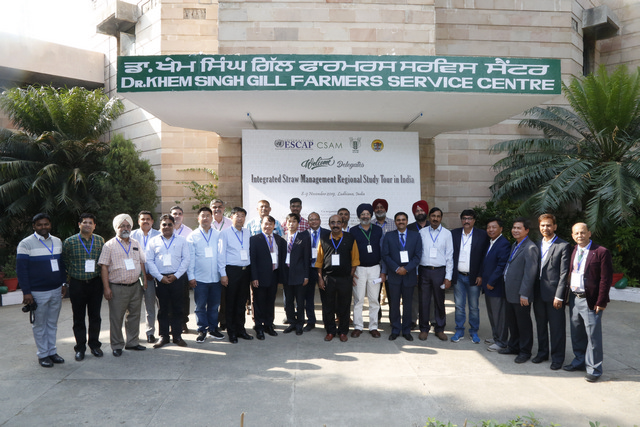Integrated Straw Management Regional Study Tour in India

On 10 November 2019, delegates from Cambodia, China, Nepal and Vietnam completed a Integrated Straw Management Regional Study Tour in Ludhiana, India. The Regional Study Tour was co-organized by the Centre for Sustainable Agricultural Mechanization (CSAM) of the United Nations Economic and Social Commission for Asia and the Pacific (ESCAP), Indian Council of Agricultural Research (ICAR), and Punjab Agriculture University on 7-10 November 2019.
Straw burning is a shared concern faced by many countries in the Asia-Pacific region. The burning of straw residue contributes to greenhouse gas emissions and poses a risk to public health through air pollution. It also contributes to losses in the agricultural sector due to soil impairment. To address this concern, CSAM launched a regional initiative on Integrated Straw Management in 2018 under which two pilot projects are being implemented in China and Vietnam to analyze and demonstrate technologies for using straw as fertilizer, fodder, energy source and substrate for mushroom growing. Planning for another pilot in Nepal is underway while Cambodia has also shown keen interest.
The Government of India is implementing a comprehensive project titled ‘Promotion of Agricultural Mechanization for In-Situ Management of Crop Residue in the States of Punjab, Haryana, Uttar Pradesh and NCT of Delhi’ to address the issue of straw burning. The Regional Study Tour aimed at sharing the experience gained from this national project regionally while also enabling a productive exchange of knowledge amongst all partners of CSAM’s initiative on integrated straw management.
A Session was arranged for the delegates to share the progress and work plan of the current or proposed pilot projects in China, Nepal and Vietnam as well as the overall status of straw management in Cambodia. The delegates visited field sites applying integrated straw management approaches in Village Burj Hakima in Ludhiana and interacted with farmers. In addition, the delegates also visited manufacturers of relevant agricultural machinery, a farmers’ Cooperative Society and Machinery Bank, and the Borlaugh Institute of South Asia.
The Study Tour demonstrated good practices and technologies for management of crop residue through its use as mulch and by incorporation into the soil via application of appropriate mechanization technologies. It also promoted innovation, regional collaboration and partnerships on integrated straw management among the participating countries.
